- Home
- Marthe Jocelyn
A Big Dose of Lucky Page 16
A Big Dose of Lucky Read online
Page 16
“Her son plays Little League,” Jimmy says. “And she goes to nearly every practice.”
“How do you know this stuff?”
He shrugs. “I guess she tells me things and I didn’t realize. Chitchat. I must know a trillion details about every family I deliver to. Between me and Pete, we could blackmail all of Parry Sound.”
“About their shopping habits?” I say. “They’d pay a lot of money to keep things like that secret.”
“Very funny,” he says. “That’s so funny I forgot to laugh.”
So now I’m lingering in the cookie section, waiting to spy on my maybe mother. In my shopping cart so far are a bag of Maltesers and a box of cereal called Lucky Charms. It has colored marshmallow bits mixed in with the cereal. Jumpin’ Joe would call it tummy rot and serve up another cauldron of Cream of Wheat porridge.
Jimmy shuffles past, carrying a carton full of bananas. “Hey!” he whispers. “She’s wearing a checkered jacket, and her hair is pulled back in a ponytail.”
My heart pumps double-time, and my hands tingle as they grip the shopping cart. I stare at a yellow bag of Dad’s Classic Oatmeal cookies until the words blur. Eventually, my total body seizure passes and I can walk along the aisle like a normal person. I find her in the produce area, holding a bundle of celery. I don’t go too close in case I throw up or faint. I don’t even look directly at her beyond the glance it takes to identify navy and white checks on her jacket and a swish of blond hair.
I use up many long seconds choosing three green apples. When I turn around, she has disappeared. I track her down a few aisles over, putting boxes of macaroni and Uncle Ben’s rice into her cart. A few minutes later, she is standing at the cash register and Jimmy is packing the grocery bags, making everything fit. I wait in line to pay a different cashier. I don’t buy the Lucky Charms, just the candy and the apples.
Jimmy pretends not to notice me, except that he taps his pocket before he lifts the bags, so I know he’s got the postcard and that his heart is beating as wildly as mine is.
WAITING FOR JIMMY TO SHOW UP
I’m with the twins out front of the Creamery, and I can’t sit still. I keep getting up to hop around. Pete and Lucy keep pulling me back onto the bench.
Abby is at work, missing all the action, so it’s up to Lucy to distract me. “Was she taller than you, do you think? What kind of shoes was she wearing? Was she buying ingredients or ready-made stuff like cake mix?”
I don’t know the answers to any of her questions, because I hadn’t been able to examine her properly. I want to turn back the clock, ignore the inner turmoil and pay better attention.
Pete has already finished the ice-cream cone I bought for Jimmy when finally, finally, we see the delivery bike trundling along River Street.
Jimmy looks sweaty but he’s grinning. The grin lets me breathe and listen to the story.
It started as an ordinary delivery. She was on the phone when he got there, so she motioned him in and kept chatting while he carried bags from the bike wagon to her kitchen table. By the third trip, when she was still blabbing away, he was getting worried about how to hand over the postcard without interrupting her conversation. But she told her friend goodbye and clicked open her change purse to find the quarter that she usually presses into Jimmy’s palm.
This time he told her no thank you, ma’am but that he had something to give her instead. She took the card from him with a puzzled face, and he said he would wait outside while she read it. He pulled the door not quite all the way closed, so he heard her gasp from where he stood on the step, and then there was this really silent silence for what felt like an hour but was probably two minutes. Then the door got wrenched open and she was staring at him with big buggy eyes and her face as pale as paste. She asked him where did he get this note? Her voice was low and quaking like someone had his hands around her throat.
We’d practiced this part. Jimmy told her he’d met a girl who’d asked him to help with her quest. She’d promised—this girl—that it wasn’t a joke or anything mean, just a real true effort to find someone she’d been separated from. Jimmy told Mrs. Beckwith he hoped he hadn’t done something wrong or brought bad news, and was there an answer?
Now the woman’s eyes were wet, and she had pink spots on her cheeks. Jimmy wanted more than anything to hop on his bike and coast down the hill with the wind blowing something fierce against his face.
After a while she asked if Jimmy thought the girl would meet her tomorrow morning. And Jimmy said yes, ma’am, he didn’t see any reason why not. He left her sitting on her back steps, holding the postcard.
“Go get him an ice cream,” I say to Pete. “You ate his.” He goes. We stand there while I leak a few tears and the others circle around sort of patting me while I get a grip on myself.
Then I say, “Jimmy, what you just did is like…it’s like you rescued somebody from a fire or taught somebody to read or something so big and important it changes whole lives.”
I hug him and he hugs me back. And then the twins are grabbing on too, and we are this elbow-jamming, arm-wrapping lump, with Pete holding Jimmy’s ice cream above our heads like a lantern.
My mother wants to meet me. Tomorrow at eleven o’clock. But not in her house. She told Jimmy a place in the park, where we can be private.
THE BIG MOMENT
“You can borrow anything you want from my closet,” says Abby.
But I wear my red blouse, since it makes me feel pretty. Then I look in the mirror, and my hair has the opposite effect. I wish again that I’d never let Lucy near it.
“Cut it off,” says Abby. “I’ll do it for you.”
Am I nuts? First I let a girl with straightener come at me, and then another one with scissors. By the time she’s done, I’m practically bald, wearing just a fuzzy black cap. I want to cry all over again.
“You look like a tribal princess,” says Abby. “I’m tempted to do it to myself. I’m serious. You’re beautiful.”
When Jimmy shows up he stares for a second, and then he says, “Yeah, better. I approve.”
Maybe he’s lying to cheer me up, but it works.
“Anyway,” I say, rubbing my head, “it’ll grow.”
We go on the bike again, but he drops me at the edge of the park and rides away, not even looking back. I told him I’d walk home, whatever happens. What if she only stays for five minutes? I don’t want him to see that. Or maybe she won’t show up at all?
SIXTEEN
SHE SHOWS UP
She’s sitting at the picnic table in the little pavilion, right where she said she’d be. Every blade of grass feels as high as a hollyhock while I’m crossing the park, thinking posture and poise, certain that I’ll trip and go splat right in front of her.
She stands up when I’m halfway there and comes toward me, arms reaching out and face crumpling. My own face crumples, and there we are, holding on before we’ve even properly seen each other’s eyes. Which are now shut while we hug and shake and cry.
MY MOTHER LOOKS ME OVER
Her hair is yellow, like in a kid’s drawing, springy and full, falling in loose, silky waves to her shoulders, not tied back like yesterday. Impossible hair. She must use Prell shampoo, the one from the magazines that doesn’t work for brown girls with frizz.
Her skin is smooth and golden, like she sits in a chair in the garden and lets the sun toast her skin. Her shoulders are bare and tanned, sticking out of a peach-colored top, and she has on white pedal pushers and sandals. Did she wake up wondering what to wear, like I did? Or did she just happen to put on these clothes that make her summery, head to toe? Even her toenails are painted the color of strawberry ice cream. I’m trying to see if any part of her looks like me, but I’m kind of blinded by the blondness and the creaminess. We sit at the table, one on each side, staring. I notice lines around her eyes and smudges under them, like maybe last night wasn’t so good for sleeping.
“What’s your name?” she says. Not much more than a whispe
r.
“Malou.” My voice comes out croaky too.
“Malou?”
“It started out Mary,” I tell her. “But there’s a song. Mrs. Hazelton, our matron in the Home, she used to sing it to all the babies.” I lick my lips. Should I sing? I start to sing. “Fly’s in the buttermilk, shoo, fly, shoo. Skip to my Lou, my darling. It has about ten verses.”
She’s smiling at me, like I warmed things up. “You have a pretty voice,” she says. “I know that song. My old nanny sang it to me too. “
She had a nanny?
A mother and a nanny?
MY FIRST QUESTION
“What do I call you?”
“Oh,” she says. “I hadn’t thought…I suppose we could start with Eve and see if that works.”
Start. Making it sound as if we’re going somewhere.
“Yesterday,” she says, “when that boy handed me your note…I nearly fell over. Really, my knees disappeared. It was my dream come true, you finding me.” Tears fill her eyes, and she blinks twice. “I swore I wasn’t going to cry!”
Suddenly, there’s a stone in my throat, hard and sharp-edged, not to be melted by her tears. What does she mean, her dream? Why didn’t she find me? And why did she—
“Why did you give me away?” I ask.
“It wasn’t me!” she cries. “It was my mother!” She gulps and steadies her voice. “I’d sworn to keep you, but my mother…she thought…she imagined she was somehow saving my life, correcting a mistake. She took you right out of my sleeping arms and carried you away to…wherever it was that she carried you. She never considered the pain she might be causing. She—”
Eve stops, and when she speaks again, her voice is flat. “But how can I criticize anyone for what kind of mother she might be? Look at me. What must you think of me?”
I’m not thinking anything. My throat feels like it might rip open with the furious heat I’m trying to swallow. Which she somehow must know, because she deflects it with a whisper.
“I called you Rosemarie,” she says. “For the hour that I had you, and all the years since.”
ROSEMARIE DELANEY
I pretend that Mrs. Hazelton is watching.
I pretend that Jumpin’ Joe is watching.
I pretend that Cady and Dot and Sara, all the other Sevens, are here, that Anne Shirley and Pollyanna and Jane Eyre are waiting for me to have the moment they never had. Mostly, orphans don’t. Mostly, orphans have dead parents, dead-forever parents. But here I am with a mother sitting right in front of me. I want to shout, Why didn’t you want me? But I sit up straighter and vow to myself, I absolutely will not say anything that will make me feel bad later.
“Rosemarie.” It’s pretty, I think. Rosemarie Delaney. Not exactly me though.
And then: “What are your…other children called?”
Her eyes fill up again.
“Oh!” she says. “There’s so much you deserve to know!”
EVE STARTS TO TALK AND DOESN’T STOP
“I have thought about you every single day of my life,” she says quietly. “That doesn’t fix anything, I know. But I want to tell you that you were never forgotten. A girl can’t have a baby and then forget.”
She doesn’t wait for me to respond. She takes a breath and plunges in, as if jumping into the icy bay.
“I was eighteen that summer, 1947. It was meant to be my last summer at home before I went to Victoria College in Toronto. My mother wasn’t keen on me going away, but my daddy believed that an educated girl is more likely to catch a smart husband. Someone with a big future. That’s why I was going to university.” She rolls her eyes as if we’re friends sharing a joke.
“My mother also wasn’t keen on me working. She had a notion that a job somehow sullied a girl. In those days, right after the war, lots of girls held on to the jobs they’d had while the boys were in the armed forces. And we all wanted to have fun. The war was over, and we’d lost so many young men. But my mother hated that. She wanted me to be dainty and nice, not getting big ideas or making choices she wouldn’t approve of.
“I had a job, though, to spite her, to get out of the house and be somewhere. I worked in a shop that printed wedding invitations. How ironic was that?”
Eve is talking quickly now. I have a million questions buzzing in my head, but I try to listen to every word so I can tell Jimmy and Abby later.
“My mother was the one who made me go that night—and didn’t she regret it later! But a dinner dance hosted by the hospital and full of unmarried doctors? She insisted. She was such a…thistle about meeting the right young man. I didn’t mind going; it was a lark to put on my best dress and climb into a boat. The party was at the hotel on Adanac Island, where every evening was another glamorous ‘do’, the whole summer long.
“All the girls were delighted that night, because of the new young men. Our mothers were more fluttery than we were, mine in particular. She must have pinched my cheeks nine times to bring up the color. Nothing could give her greater pleasure, she said, than to have her daughter attract the eye of a medical intern.” Eve laughs out loud.
It’s the first time I hear my mother laugh! It’s a merry laugh, slides right out—it’s easy to see her as a pretty teenager.
“What my mother did not expect,” she says, “is that I would meet the handsomest medical student in the room, with the best marks in his class and the most friends. And that he would be a Negro.”
Andy Bannerman.
“Andy Bannerman,” she whispers, “was beautiful.”
She stares off toward the treetops at the edge of the park. “I never saw anyone with such confidence! Especially a Negro man in a room full of white people staring at him sideways. He was a beauty guy! That’s what we said back then. Even my husband isn’t so good-looking.”
She looks at me, head tilted to one side. “Has it happened to you yet? Have you ever met a boy who makes your heart flip in your chest like a fish in a bucket?”
My mind flies to Frankie. She has described it perfectly.
“Oh!” She sees my face heat up. “You do know! Well then, you’ll understand, at least a little.”
She laughs again. “He was such forbidden fruit and I was a shameless flirt, provoking my mother on purpose. She tried to stop us dancing. Twice! She suddenly didn’t care that Andy was nearly a doctor, and smart as anything. He’d got himself from Jamaica to Ottawa for medical school and now up here for a residency. Being colored, he had to work twice as hard as anybody else.”
She sighs. “But there were bigots trying to stomp him down anywhere he went. What a crazy world. Not as bad as in the States,” she says. “No one tried to lynch him.”
Her face changes, like, Oops, she remembers who she’s talking to. She reaches over and puts her pale fingers around my brown wrist. “Do you know about any of that?” she says. “In Alabama and Arkansas, all over the States, how they have to fight just to drink from a damn water fountain?”
They?
I nod. I hear Jeff and Bender in my head. Your money’s as good as anybody’s, once we wash the dirt off.
In Canada too, I’m starting to realize.
WHAT IF YOU’RE BLIND
And your friend is a painter?
You will never see how she shows herself to the world.
Or maybe you’re deaf and your sister is a singer.
You will never hear her voice.
Or what if you were born with white skin? And your daughter is the color of coffee with a splash of cream? How can you ever really know who she is?
THE TELEPHONE WAS TOO RISKY
“Anyway,” says Eve, “my mother hustled me out of that dance as quickly as she could, without making a scene that her friends might notice.” She grins. “But not quickly enough. It had already stopped being flirtation and turned into something else.”
I’m holding my breath. I can’t see how this has anything to do with donors or deposits or turkey basters. Eve is telling me a love story.
The
telephone at Eve’s house was right there in the front hall, where anyone could listen. But she’d already asked Andy, in line for the cloakroom at the dance, bold as brass buttons, she said. Would he like to see her again? Could they meet for an ice cream? Looking straight into his bright gray eyes.
Yes, they met for milkshakes at the Creamery, for walks in the pinewoods, always in secret and ever more secretly as they became more…intimate.
“I was spinning with it,” says Eve. “I’d be doing the dishes or folding a towel and I’d start to laugh out loud, tickled with the power of loving a person who was so utterly wrong.” She sighs. “It was heaven.”
But their time together was dwindling. Eve was to leave for university in nine days on the afternoon when Andy arrived at their meeting place, his playful sweetness nowhere to be seen.
“He’d come to say goodbye,” whispers Eve. “There’d been inquiries at the hospital about some program he’d been involved in, questions about ethics or some such nonsense. The whole batch of interns was being disbanded and sent away. He’d be leaving the next morning, driving back to Ottawa in a Buick full of buddies. He only came to tell me.”
I’M SO CONFUSED
None of what Eve describes matches up with what I heard from Judy and Preesha. This is an entirely different story. Except for the leading man.
Eve keeps going.
“My mother assumed that my wailing woe was because I dreaded university,” she says. “She thought she’d won, that I would stay at home and help with her War Widows luncheons and forget any notion of ‘higher education.’ But somehow I managed to stifle my misery about Andy, and off I went. I wrote him long letters and ached to receive his. But I was determined that they would come to my own dormitory mailbox, where no one could snatch them away from me. Not that there were so many. Only two.”

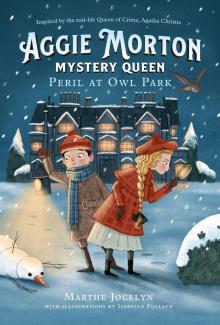 Peril at Owl Park
Peril at Owl Park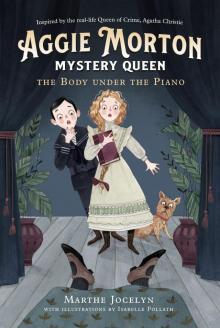 The Body under the Piano
The Body under the Piano Mable Riley
Mable Riley Earthly Astonishments
Earthly Astonishments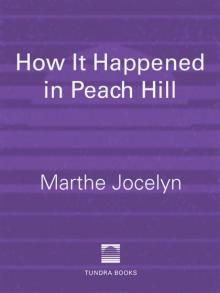 How It Happened in Peach Hill
How It Happened in Peach Hill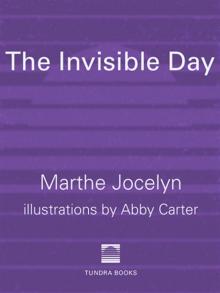 The Invisible Day
The Invisible Day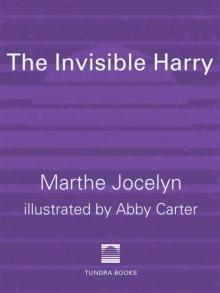 The Invisible Harry
The Invisible Harry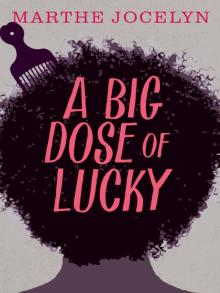 A Big Dose of Lucky
A Big Dose of Lucky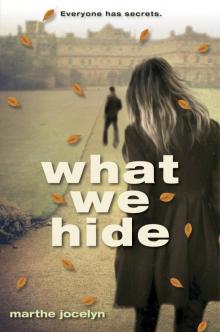 What We Hide
What We Hide Would You
Would You Secrets
Secrets First Times
First Times The Invisible Enemy
The Invisible Enemy Folly
Folly